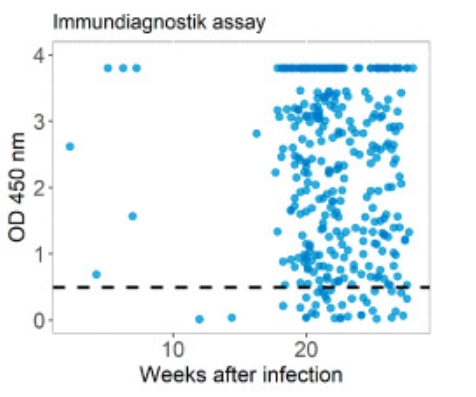2 Minute Read
Immundiagnostik’s IDK® anti-SARS-CoV-2 IgG ELISA was recently featured in a publication by Eberhardt et al.
Antibody responses to SARS-CoV-2 became a key research focus during the COVID-19 pandemic. A recent study investigated the ability of the Immundiagnostik IDK® anti-SARS-CoV-2 S1 IgG ELISA (Quantitative) to detect antibodies compared to other widely used commercial assays.
Serum samples from convalescent individuals and a negative control group were simultaneously analyzed by the IDK® anti-SARS-CoV-2 S1 IgG (Quantitative) assay and the commercial assays.
The IDK® anti-SARS-CoV-2 S1 IgG (Quantitative) assay demonstrates the highest sensitivity (89.2%) and is of high specificity (100%). The IDK® assay also targets spike protein subunit 1 (S1), which the researchers conclude correlates more strongly with serum-neutralizing activity than assays that detect anti-nucleocapsid protein (anti-NC) antibodies.
The researchers also determined the IDK® anti-SARS-CoV-2 S1 IgG (Quantitative) assay can be used in combination with a similarly sensitive and specific NC-based protein assay, such as the Roche Elecsys® (anti-NC pan-Ig).
 Antibody values of the IDK® anti-SARS-CoV-2 IgG ELISA targeting the spike protein displayed against the weeks after infection for each individual. Credit: Eberhardt et al.
Antibody values of the IDK® anti-SARS-CoV-2 IgG ELISA targeting the spike protein displayed against the weeks after infection for each individual. Credit: Eberhardt et al.
The results of this study demonstrate how the IDK® anti-SARS-CoV-2 S1 IgG (Quantitative) ELISA can be used to help further understand COVID-19.
Read the full publication: Evaluation of a New Spike (S)-Protein-Based Commercial Immunoassay for the Detection of Anti-SARS-CoV-2 IgG
The virus SARS-CoV-2 (severe acute respiratory syndrome coronavirus 2) is an enveloped, single-stranded RNA virus belonging to the coronavirus family Coronaviridae. Coronaviruses have a similar composition as they are all composed of the spike (S), envelope (E), membrane (M), and nucleocapsid (NC) structural proteins and several non-structural proteins.
After SARS-CoV-2 infection, the virus accesses host cells via the protein ACE2 (angiotensin-converting enzyme) and causes the disease COVID-19.
The severity of the disease ranges from asymptomatic, mild (fever, cold, cough, tiredness, shortness of breath, and loss of smell), and severe, to most severe (death). Aging and several co-morbidities (e.g., diabetes mellitus, cardiovascular diseases, and chronic pulmonary diseases) are described as risk factors for severe progressive forms of COVID-19.
Seroconversion time varies depending on the measured class of antibodies. The onset of IgG antibodies is usually observed after 11 to 14 days, and seroconversion rises to its maximum after three to six weeks.
Differences in IgG levels among individuals are expected after COVID-19 vaccination as the immune response following vaccination depends on the vaccine used and the age of the person, among other things.
The IDK® anti-SARS-CoV-2 IgG ELISA (Quantitative) is for Research Use Only. Not for Use in Diagnostic Procedures. For Laboratory Professional Use Only.
No content on this site, regardless of date, should ever be used as a substitute for direct medical advice from your doctor or other qualified clinician.